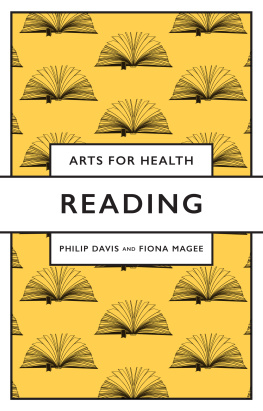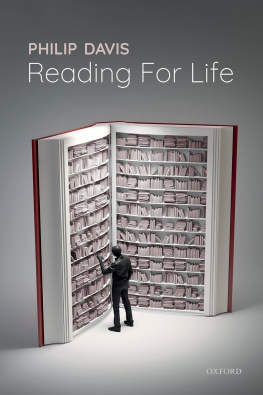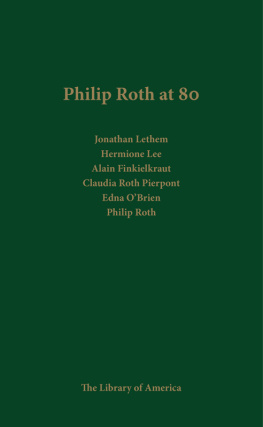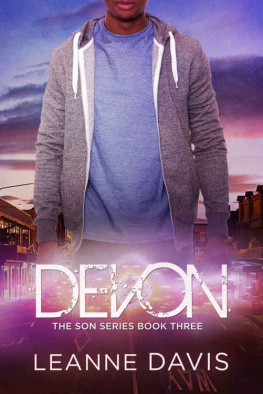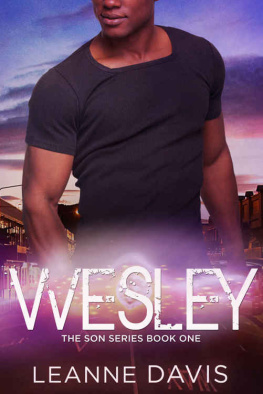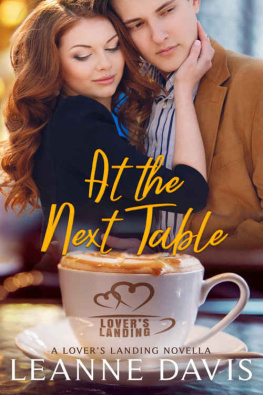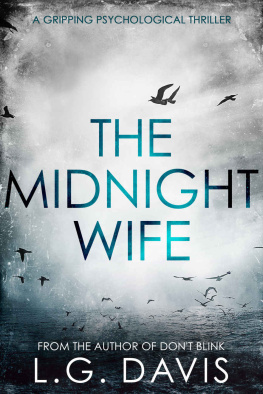Philip Davis - Reading
Here you can read online Philip Davis - Reading full text of the book (entire story) in english for free. Download pdf and epub, get meaning, cover and reviews about this ebook. year: 2020, publisher: Emerald Publishing Limited, genre: Art. Description of the work, (preface) as well as reviews are available. Best literature library LitArk.com created for fans of good reading and offers a wide selection of genres:
Romance novel
Science fiction
Adventure
Detective
Science
History
Home and family
Prose
Art
Politics
Computer
Non-fiction
Religion
Business
Children
Humor
Choose a favorite category and find really read worthwhile books. Enjoy immersion in the world of imagination, feel the emotions of the characters or learn something new for yourself, make an fascinating discovery.
- Book:Reading
- Author:
- Publisher:Emerald Publishing Limited
- Genre:
- Year:2020
- Rating:4 / 5
- Favourites:Add to favourites
- Your mark:
- 80
- 1
- 2
- 3
- 4
- 5
Reading: summary, description and annotation
We offer to read an annotation, description, summary or preface (depends on what the author of the book "Reading" wrote himself). If you haven't found the necessary information about the book — write in the comments, we will try to find it.
Reading — read online for free the complete book (whole text) full work
Below is the text of the book, divided by pages. System saving the place of the last page read, allows you to conveniently read the book "Reading" online for free, without having to search again every time where you left off. Put a bookmark, and you can go to the page where you finished reading at any time.
Font size:
Interval:
Bookmark:
READING
Series Editor: Paul Crawford, Professor of Health Humanities, University of Nottingham, UK
The Arts for Health series offers a ground-breaking set of books that guide the general public, carers, and healthcare providers on how different arts can help people to stay healthy or improve their health and well-being.
Bringing together new information and resources underpinning the health humanities (that link health and social care disciplines with the arts and humanities), the books demonstrate the ways in which the arts offer people worldwide a kind of shadow health service a non-clinical way to maintain or improve our health and well-being. The books are aimed at general readers along with interested arts practitioners seeking to explore the health benefits of their work, health and social care providers, and clinicians wishing to learn about the application of the arts for health, educators in arts, health, and social care, and organisations, carers, and individuals engaged in public health or generating healthier environments. These easy-to-read, engaging short books help readers to understand the evidence about the value of arts for health and offer guidelines, case studies, and resources to make use of these non-clinical routes to a better life.
Other titles in the series:
Film Steven Schlozman
Theatre Sydney Cheek-ODonnell
Singing Yoon Irons and Grenville Hancox
Music Eugene Beresin
Painting Victoria Tischler
Dancing Sara Houston
Drawing Curie Scott
Storytelling Michael Wilson
BY
PHILIP DAVIS
AND
FIONA MAGEE

United Kingdom North America Japan India
Malaysia China
Emerald Publishing Limited
Howard House, Wagon Lane, Bingley BD16 1WA, UK
First edition 2020
2020 Philip Davis and Fiona Magee. Published under exclusive licence by Emerald Publishing Limited.
Reprints and permissions service
Contact:
No part of this book may be reproduced, stored in a retrieval system, transmitted in any form or by any means electronic, mechanical, photocopying, recording or otherwise without either the prior written permission of the publisher or a licence permitting restricted copying issued in the UK by The Copyright Licensing Agency and in the USA by The Copyright Clearance Center. No responsibility is accepted for the accuracy of information contained in the text, illustrations or advertisements. The opinions expressed in these chapters are not necessarily those of the Author or the publisher.
British Library Cataloguing in Publication Data
A catalogue record for this book is available from the British Library
ISBN: 978-1-83867-308-6 (Print)
ISBN: 978-1-83867-305-5 (Online)
ISBN: 978-1-83867-307-9 (Epub)

The Arts for Health series aims to provide key information on how different arts and humanities practices can support, or even transform, health and well-being. Each book introduces a particular creative activity or resource and outlines its place and value in society, the evidence for its use in advancing health and well-being, and cases of how this works. In addition, each book provides useful links and suggestions to readers for following-up on these quick reads. We can think of this series as a kind of shadow health service encouraging the use of the arts and humanities alongside all the other resources on offer to keep us fit and well.
Creative practices in the arts and humanities offer a fantastic, non-medical, but medically relevant way to improve the health and well-being of individuals, families, and communities. Intuitively, we know just how important creative activities are in maintaining or recovering our best possible lives. For example, imagine that we woke up tomorrow to find that all music, books, or films had to be destroyed, learn that singing, dancing, or theatre had been outlawed, or that galleries, museums, and theatres had to close permanently; or, indeed, that every street had posters warning citizens of severe punishment for taking photographs, drawing or, writing. How would we feel? What would happen to our bodies and minds? How would we survive? Unfortunately, we have seen this kind of removal of creative activities from human society before and today many people remain terribly restricted in artistic expression and consumption.
I hope that this series adds a practical resource to the public. I hope people buy these little books as gifts for family and friends, or for hard-pressed healthcare professionals, to encourage them to revisit or to consider a creative path to living well. I hope that creative public health makes for a brighter future.
Professor Paul Crawford
The authors of this book come from the Centre of Research into Reading, Literature and Society (CRILS), founded by Philip Davis at the University of Liverpool in 2011. It arose out of 30 years of teaching literature as a personal endeavour, particularly through the creation of part-time Masters courses attracting a wide range of non-conventional mature students, and five years of increasing collaboration with health professionals and psychologists to research the personal effects of reading.
The Reader was founded in 1997 by Jane Davis with Sarah Coley and Angela Macmillan after many years of teaching in the University of Liverpool Continuing Education programme. The aim of The Reader initially was to get great books out of the university and into the hands of people who need them.
These two enterprises developed in collaboration to secure a place for the serious reading of literature in a world where you were as unlikely to find a poem in an old peoples home or addiction rehab centre, as you were to find room for a personal reading of a great novel within a university literature course. Both The Reader and CRILS set out to change that, in the belief that literature is a tool for helping humans survive and live well.
The Reader has developed its shared reading model over the past 20 years, and CRILS brought together a multidisciplinary team to understand what goes on within that practice of small community groups reading aloud and thinking together. CRILS ceased to exist as a research unit on the formal retirement of Philip Davis in 2019, but its work continues through its many research associates, especially Professor Josie Billington at the University of Liverpool, and through writings such as this present book which brings together some of the research undertaken by members of the CRILS team over the past 10 years. See https://www.liverpool.ac.uk/humanities-social-sciences-health-medicine-technology/reading-literature-and-society/.
In 2019, The Reader opened its national headquarters at Calderstones Mansion House, in Calderstones Park, Liverpool, and launched the International Centre for Shared Reading where a wide programme of reading courses takes place. See www.thereader.org.uk for details.
The introductory question that provides our chapter title means, of course: What has reading got to do with health and well-being?
But before that lies a more aggressive version of the question:
Font size:
Interval:
Bookmark:
Similar books «Reading»
Look at similar books to Reading. We have selected literature similar in name and meaning in the hope of providing readers with more options to find new, interesting, not yet read works.
Discussion, reviews of the book Reading and just readers' own opinions. Leave your comments, write what you think about the work, its meaning or the main characters. Specify what exactly you liked and what you didn't like, and why you think so.

